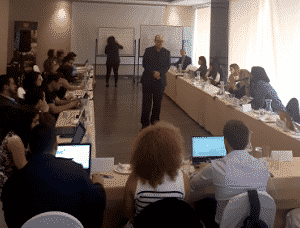12 March 2020 –

The UNCAC Coalition’s new regional coordinator for Latin America, Iñaki Albisu Ardigo, recently participated in the Second Civil Society Roundtable on Fast-Tracking UNCAC Implementation, which was organized by UNODC with support of the UK government in Quito, Ecuador. From 18-20 February 2020, the follow-up conference to the one held in Cartagena, Colombia, in May 2019, brought together 25 civil society organizations (CSOs) from nine Latin American countries to evaluate the state of implementation of the UNCAC in the region and identify action points for CSOs to participate in the anti-corruption discourse both on a national and global level.
Based on previous consultations UNODC undertook with CSOs on priority issues in the region, the conference covered four general topics in relation to the UNCAC, which were discussed in the format of panels, as well as working groups:
- criminal liability of legal persons (companies, foundations, trusts, etc.) for cases of corruption,
- whistleblowing,
- national political integrity systems (an overarching concept that includes conflicts of interest and asset declarations), and
- political financing.
The theme of civil society participation was omnipresent. While questions to panellists focused on national approaches to UNCAC implementation, the working groups and informal conversations during the conference centred around cross-country cooperation and anti-corruption efforts that organizations could undertake together.
The UNCAC Coalition provided insight into its coordination role that aims to bring CSOs together to advance the global anti-corruption agenda on the one hand, and to support their participation in the national implementation of the UNCAC review process, on the other.
The Coalition encouraged the anti-corruption groups to produce CSO parallel reports on national UNCAC implementation to inform the UNCAC review processes in their countries, for which the Coalition provides technical and financial support.
Most civil society organizations were unaware of how the UNCAC review process worked, when their countries would be reviewed or how (if ever) they would be consulted during the review process. Consequently, the UNCAC Coalition’s Transparency Pledge sparked great interest among the participants and was generally seen as an important tool that they could employ to demand more space and participation for civil society in the UNCAC review process. Several groups stated that they would engage their governments on committing to the Pledge’s transparency principles.
The conference concluded with the presentation of a series of possible action points the CSOs had come up with in relation to the central topics discussed:
On criminal liability of legal persons:
- Map sanctions on legal persons in the region and document amounts of fines paid,
- Develop a study on small and medium enterprise (SME) minimum compliance policies within national Latin American legislation.
On whistleblower protection:
- Develop a study on state-of-the-art legal and institutional frameworks for whistleblower protection,
- Develop and implement awareness raising campaigns on whistleblowing,
- Conduct a study on the perception of the word “alertadores” (Spanish term for “whistleblowers”).
On integrity systems:
- Conduct a comparative study on asset declaration regimes in Latin American countries,
- Work towards standardised data and content formats for asset declarations, in particular the legal and natural persons referenced in those declarations,
- Develop standards of integrity for political parties (party and campaign financing regulations and disclosure requirements).
Furthermore, the CSOs reiterated the important action points already developed in a Declaration during the Cartagena conference in May 2019 and suggested specific action points to the UNODC for future conferences in the region.
An overarching concern in all of these action points was the restricted space (if any) provided by states and other stakeholders for civil society to actively participate in and positively contribute to the UNCAC review process, as well as the global anti-corruption agenda. In light of the first-ever UN General Assembly Special Session against Corruption, which will take place on 26-28 April 2021, CSOs in Latin America are poised to make their voices and concerns heard and to participate, make a difference, and fight corruption together.




